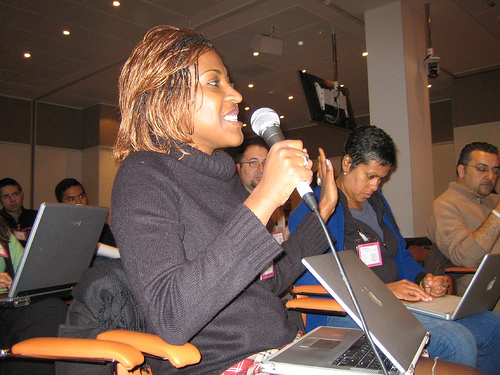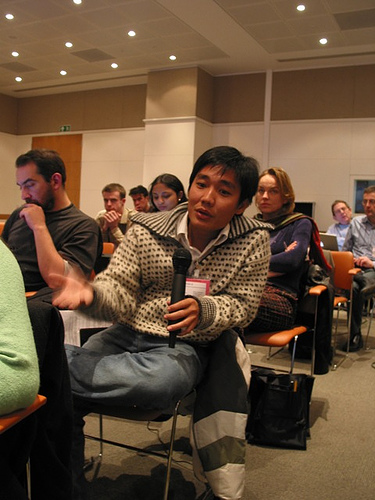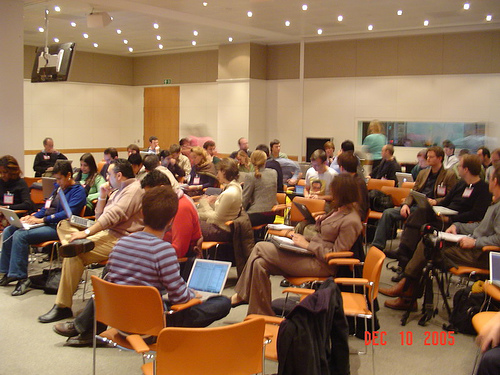10 Questions with Joshua Porter
del.icio.us | Reddit | BlinkList | Simpify
Well it’s Monday Morning and that means it times for the first 10 questions segment of the week. This week I am starting off with a bang. I have Joshua Porter from bokardo.com and a member of the Web 2.0 Workgroup in the spotlight.It seems like every interview I have done in the last week has gotten better and better and this one is no exception to that trend.
How long have you been blogging and why did you start blogging?
I’ve been blogging for about 5 years. I created the current incarnation of Bokardo.com, which has morphed into talking about designing for Web 2.0, in 2003.
Part of the reason why I started blogging is the same reason that a lot of people start writing: self-validation and peer-validation. One thing that I think we all want is to have our ideas validated, and getting them into words on a screen or page is the best way to do that.
The other part of the reason was practice. I’ve always had a really hard time in the writing classes that I’ve taken, as I’m easily distracted and refuse to write about stuff I’m not interested in. But I really wanted to learn how to write well and any good book on the subject will say that the best way to become a writer is to write each and every day. And blogging is a great way to get yourself writing because it creates artificial demand. We delude ourselves into thinking the world is out there just waiting for our next blog post, and so we write. But in reality if we dropped off the face of the earth we would simply lay at the bottom of the feed list, and only one or two people would notice.
What has changed since you started blogging?
Many things. First, there are many more bloggers out there writing. Second, many of them are now in this to make money. Third, RSS has come into the picture. These things combine for some interesting results.
The positive outcome of these things is that we’re having many more, deeper conversations. That’s great, and we can increasingly find people with similar interests as us. For example, I can go online each and every day and find someone talking about very specific things, like how to model human attention in web applications, for example, which very few people were talking about 5 years ago. Specialization, and thus knowledge, is accelerating. Also, people are really making money now, whether it’s from new jobs they get as a result of their blog or advertising they put on it. I would like to think that at the end of the day the deluge of content is making us smarter. Just imagine how much more access to ideas we have than any age of mankind, ever. We need to appreciate that.
But there are certainly downsides. First, our attention is completely fractured. RSS gives us efficiency of attention on any one web site, driving the time we spend on that site closer to zero. But then it enables us to fracture it again by multiplying the smaller amount of time by many more sites than before. So we’re making increasing demands on our attention. Second, the drive for monetizing blogs has really hurt some of the content producers out there. You’ll see a lot of posts by bloggers who just want to get atop the attention heap again without really adding any value to an existing idea. It’s like waving to strangers.
Also, we see a lot of blogging “networks” spring up in the hope of monetization, and this concerns me a little. It concerns me because it will eventually take power away from individual bloggers and put it into the hands of the networks, who aren’t adding any value on their own except publicity. Over time, we will come to resent them just as we resent music labels, movie studios, and other networks that do the same thing in other industries. And if those networks are in it for advertising, then you can forget long, thoughtful posts on a subject. It’s not long before posts become short, shock value pieces created to serve up pageviews and Google Adsense Ads. I’ve known several bloggers who have gone that route, and now they’re writing junk and getting paid measly for it.
What is the most enjoyable aspect of your blogging efforts?
The most enjoyable aspect is when I can articulate something such that I cannot improve it. This happens rarely, but it’s certainly worth waiting for.
To you what is the most important aspect of a person’s blog?
The most important aspect of a person’s blog is the extent to which it represents a person’s true feelings on a subject. In other words, how honest it is. I’m tired of blogs written solely for marketing purposes or for hyping something. But that’s not to say that corporate blogs are necessarily bad. I’ve been impressed with the O’Reilly Radar blog as a blog that serves a marketing purpose but does so as a conversation, not as a one-way spiel.
Why do you think blogging is so disruptive?
Blogging is disruptive because it gives everyone a voice on relatively equal footing. If you have a strong voice, you will eventually be heard. And when people are heard, disruptions occur naturally.
What blogs are on your daily reading list?
Well, I closely follow a group I’m involved in, the Web 2.0 Workgroup, as the members tend to write thoughtful, relevant posts on new issues in technology. I also read the Gillmor Gang folks, including Steve Gillmor, Doc Searls, and Jon Udell. Those guys are way out ahead of the curve, and always have something interesting to say. It’s like sitting in a barbershop of old men drinking beers. If you listen long enough you start to learn stuff without realizing it.
And then a whole raft of designers, including Molly Holzschlag, Eric Meyer, and Jeffrey Zeldman.
More and more, though, I’m finding newer voices in the field that don’t have the name of the above folks, but who I learn just as much from, if not more. People like Kathy Sierra and Thomas Vander Wal fit into this category.
Where do you see blogging in say 5 years?
I see blogging as the primary means of communication between companies and individuals. I see blogging as related more to a person’s Identity than it is now. I think that our blogs will be our life portfolio, not just an artistic or professional one. I see blogs becoming a store of our personal data, with which we perform transactions, be it with our financial information, our likes/dislikes, any other personal information. I see blogs as the start to personal web services, with HTML being the first, RSS being the second, and countless others thereafter.
Blogging will be even more powerful in 5 years than it is now. It’s still in its infancy.
What effect will blogging have on what people currently call “mainstream media’ in say 5 or 10 years?
The shakedown is happening now. In addition to creating a lot of new great writers, blogging will force the great writers out there, many of whom are being paid by newspapers and other MSM, to become bloggers and sit down in the muck with the rest of us. I have great contempt for those people who try to make a clear distinction between MSM writers and bloggers, talking about bloggers in their pajamas or the “cult of mediocrity”. The truth is, we’re all mediocre, and we all have something important to say if given the chance.
There is very little difference between bloggers and MSM writers. If you’ve got an audience, you’re the media.
Blogging has become a powerhouse in the last 2 years why do you think that happened?
Because once we are part of the conversation, we expect to continue to be part of it.
What advice would you give someone who is just starting out blogging?
Blogging is a relationship. It starts out like a first date, with both parties being nervous as hell. You’re worried about what you might say, even though the other person is willing to give you a listen. If you move to a second date, then good. But don’t get worried if it fizzles on the first. Your success will happen when you aren’t waiting for it, just like you find someone when you aren’t looking.
Don’t talk too much about yourself, don’t be too cocky, and try to ask good questions and learn about the person you’re talking with. Don’t rush to judgment of whether they’ll be there for you or not. You can’t tell until you’ve been out on a few dates. Much of what you say won’t get a response, but that doesn’t mean they aren’t listening.
It’s what you do when you’re sick, unshowered, and on the wrong side of the bed that makes your average. It’s the average that counts.
Blog, Blogger, Blogging, Bokardo, Doc Searls, Eric Meyer, Jeffery Zeldman, Jon Udell, Joshua Porter, Kathy Sierra, Molly Holzchlag, Steve Gillmor, Thomas Vander Wal, Web 2.0 Workgroup
This entry was posted on Monday, December 19th




 Finally the elections of the
Finally the elections of the 




